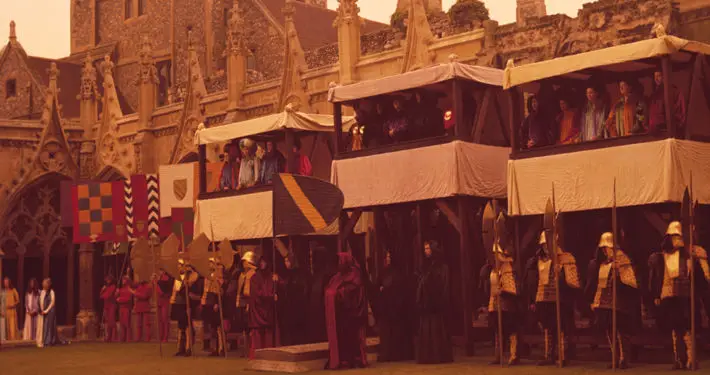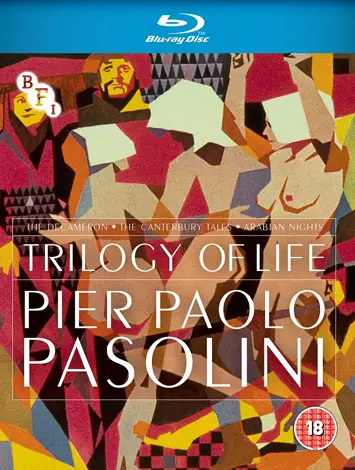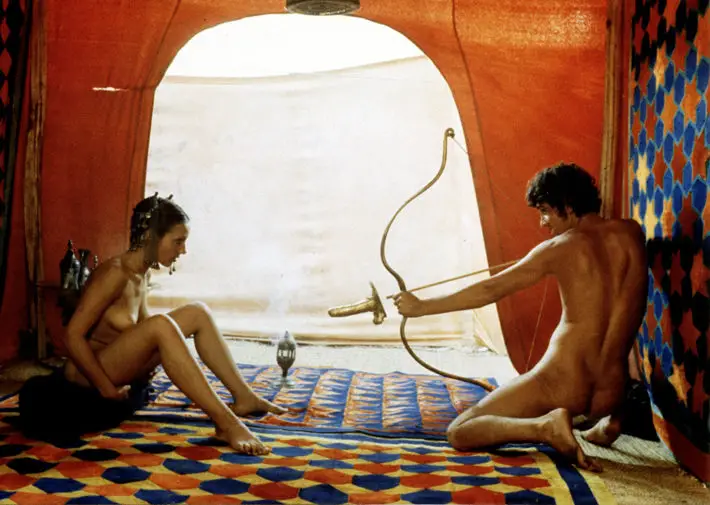Trilogy of Life: Three Films by Pier Paolo Pasolini – Review

by Sarah Morgan
“Challenging consumer capitalism and celebrating the uncorrupted human body while commenting on contemporary sexual and religious more and hypocrisies, Pasolini’s scatalogical humour and rough-hewn sensuality leave all modern standards of decency behind.”
That’s what the BFi’s press release states about Italian poet, philosopher and film-maker Pier Paolo Pasolini’s Trilogy of Life, which is receiving a rather swanky Blu-ray boxset release.
 What the organisation seems to be saying, in a rather highfaluting way, is that each movie is a bit cheeky, may offend the prudish, won’t be to everybody’s taste and is not that accessible, despite there being an English language version available on each disc.
What the organisation seems to be saying, in a rather highfaluting way, is that each movie is a bit cheeky, may offend the prudish, won’t be to everybody’s taste and is not that accessible, despite there being an English language version available on each disc.
“Unabashed look at taboo subjects”
And they’d be right. Pasolini’s work will leave many people cold. He wasn’t part of the neo-realist movement headed by Roberto Rossellini, Luchino Visconti, Federico Fellini and their ilk. Instead, he caused controversy with his unabashed look at taboo subjects; his final film, Salò, or The 120 Days of Sodom, offended many due to its explicit look at sadistic violence.
His Trilogy of Life doesn’t go quite as far, and in some respects offers a bucolic look at life in centuries gone by. Having said that, it pulls few punches in depicting the lives of its characters.
Each film is based on a different text made up of several stories. The first production is The Decameron, inspired by the 14th century novel of the same name by Giovanni Boccaccio. Each tale is linked by the painting of a mural (Pasolini himself plays the painter).
The second will probably be of most interest to British audiences. The Canterbury Tales features several adaptations of Geoffrey Chaucer’s stories and features such well-known faces as Tom Baker, Robin Askwith and Hugh Griffith. Pasolini pops up again as Chaucer.
“Difficult to imagine it winning over new fans”
Finally, Arabian Nights was shot over a two-year period in Yemen, Ethiopia, Iran and Nepal. It’s quite unlike other versions of the stories and is certainly not for children.
In all three films, the emphasis is on the erotic, although there’s nothing particularly sexy about any of it, despite copious amounts of nudity – both male and female. At least Pasolini couldn’t be accused of inequality in that regard.
Unfortunately, the slapstick nature of the humour simply isn’t amusing. Maybe it went down well with Italian audiences at the time, but it’s difficult to imagine it winning over new fans now, even among the most dedicated cineastes.
There are, however, several intriguing special features available, including Pasolini’s visual notes for an unrealised project and a revealing interview with Askwith about his friendship with the director.
Includes both Italian language and English language versions of all three films
Notes for an African Oresteia (1970, 73 mins): Pasolini’s visual notes for an unrealised film project
Pasolini and the Italian Genre Film (2009, 37 mins)
Robin Askwith on Pier Paolo Pasolini (2015, 23 mins)
Deleted sequences (1974, 21 mins): deleted sequences from Pasolini’s Arabian Night
Trailers
Illustrated booklet with essays by Sam Rohdie and Roger Clarke, original reviews, biography of Pasolini and full film credits (NB. first pressing only)
'Trilogy of Life' is released on Blu-ray by BFI, £34.99
,









